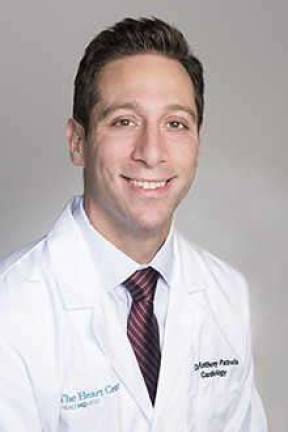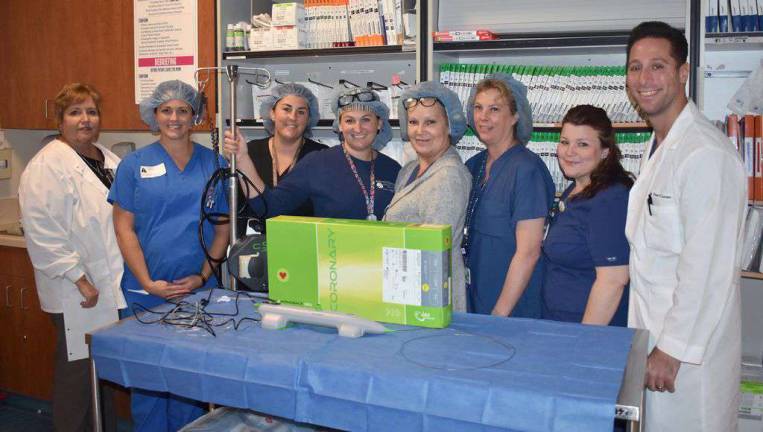A minimally-invasive tool in the fight against coronary artery disease


The St. Luke's Cornwall Hospital Cardiovascular Institute believes prevention is always the best medicine, but when the situation calls for more aggressive treatment it is important that your physician has the right tools to provide the most effective intervention. Medical advances are coming at a rapid pace, and traditional procedure options are quickly being supplemented by less invasive and safer alternatives that can provide even better outcomes.
The treatment of heart disease is experiencing just such a renaissance, and it could not come at a more important time. According to the latest statistics from the Centers for Disease Control and Prevention, heart disease is the leading cause of death in the United States. More than 600,000 Americans die each year, accounting for more than one in four deaths. Heart disease is a broad term that refers to a multitude of conditions, but the most common type is Coronary Artery Disease (CAD). This is what can lead to a heart attack.
Just about everyone is at risk for CAD, and the risk factors increase with age. However, there are contributing factors that can increase your risk, such as uncontrolled high blood pressure, high cholesterol, a family history of heart disease, diabetes, and especially cigarette smoking, which is certainly highest on the list. How do you know if you are suffering from Coronary Artery Disease? A common symptom is tightness of the chest in the center beneath the sternum, which sometimes radiates to the left arm. There are also some atypical presentations such as severe nausea or reflux that won't go away with medications for indigestion, lightheadedness and just an overall feeling of being unwell. This is why being alert and paying attention to symptoms is important.
Proper diagnosis is also crucial for determining the correct course of treatment. If you're having active symptoms that aren't going away, it is important to get evaluated in an emergency department right away because you don't want to miss the fact that you are having a heart attack. If the chest pain is intermittent and is not occurring at rest at that moment, you should talk to your doctor who will often refer you for evaluation with a cardiologist. The treatment plan will depend on the severity of the issue. We always start with the least invasive option. If you have a mild blockage, aggressive medical therapy and risk factor modification is the first step. If we discover a severe blockage and your symptoms persist, then it often needs to be treated directly. Again, the least invasive options such as a coronary stenting procedure, which is done through a small pinhole, are considered first. Some blockages are beyond the limitations of stenting, and those patients need open heart bypass surgery.
Not all atherosclerotic plaque is the same. Occasionally, inflammation can cause cells inside the plaque to differentiate and actually produce calcium. This causes the plaque to harden over time and become resistant to dilation. These plaques are often very difficult to stent so we have to modify the plaque in some way. That's where a procedure called atherectomy comes into play.
At St. Luke's Cornwall Hospital, we currently utilize the orbital atherectomy. This procedure features a high-speed rotational crown that is coated with microscopic diamond particles. The orbital motion of the crown removes plaque from a diseased artery by sanding it down into tiny pieces. Stenting severe calcification in coronary blood vessels is often difficult because of the inability to fully dilate the balloon used prior to the placement of the stent. A stent that cannot be fully expanded increases the risk of clotting around the stent (thrombosis) and the affected area narrowing again after the treatment (restenosis).
Orbital atherectomy allows for these calcifications to be drilled away before placing the stent, which can provide better post-procedure outcomes. This technology provides us with a tool to treat severely calcified plaque build-up with a minimally-invasive procedure. Atherectomy allows for catheter-based stenting of coronary lesions that would otherwise require open-heart bypass surgery.
We recently performed this procedure for the first time at SLCH, and the results were remarkable. The patient was discharged home the very next day.
The St. Luke's Cornwall Hospital Cardiovascular Institute is committed to maintaining your heart health by providing quality care with coordinated follow-up appointments and communication between referring physicians, cardiologists and the interventional cardiologists. We encourage everyone to evaluate their lifestyle choices and make prevention a priority. It is never too late to make better decisions about your health; all you need is a goal, a plan and the desire to live better.
About Dr. Anthony Patrello
Dr. Anthony Patrello is an interventional cardiologist at The Hudson Valley Heart Center and the Medical Director of the St. Luke's Cornwall Hospital Cardiovascular Institute. He has particular expertise in treating complex coronary artery disease, peripheral vascular disease, heart valve disease, as well as preventative medicine. He is board certified in cardiovascular disease, nuclear cardiology, echocardiography, interventional cardiology, and internal medicine. He has received the honor of being elected a Fellow of the American College of Cardiology and the Society for Cardiovascular Angiography and Interventions. The Hudson Valley native is excited to provide cutting edge care to the community where he was raised.
About St. Luke's Cornwall Hospital
St. Luke's Cornwall Hospital (SLCH) is a not-for-profit community hospital with campuses in Newburgh and Cornwall, NY. The hospital is dedicated to serving the health care needs of the Hudson Valley and has achieved excellence in the delivery of compassionate and comprehensive health care services. The Joint Commission noted SLCH for excellence in Key Quality Measures in the management of Heart Attack, Heart Failure, Stroke and Surgical Care. SLCH is also recognized as an industry leader in using information technology to improve patient care, by winning the Most Wired Award for the fourth year in a row. In January 2018, SLCH officially became part of the Montefiore Health System to strengthen the delivery of health care locally and enhance access to exceptional specialty care for Hudson Valley residents.
 |
| St. Lukes Cornwall Hospital 70 Dubois St, Newburgh, NY 12550 (845) 561-4400 www.stlukescornwallhospital.org |